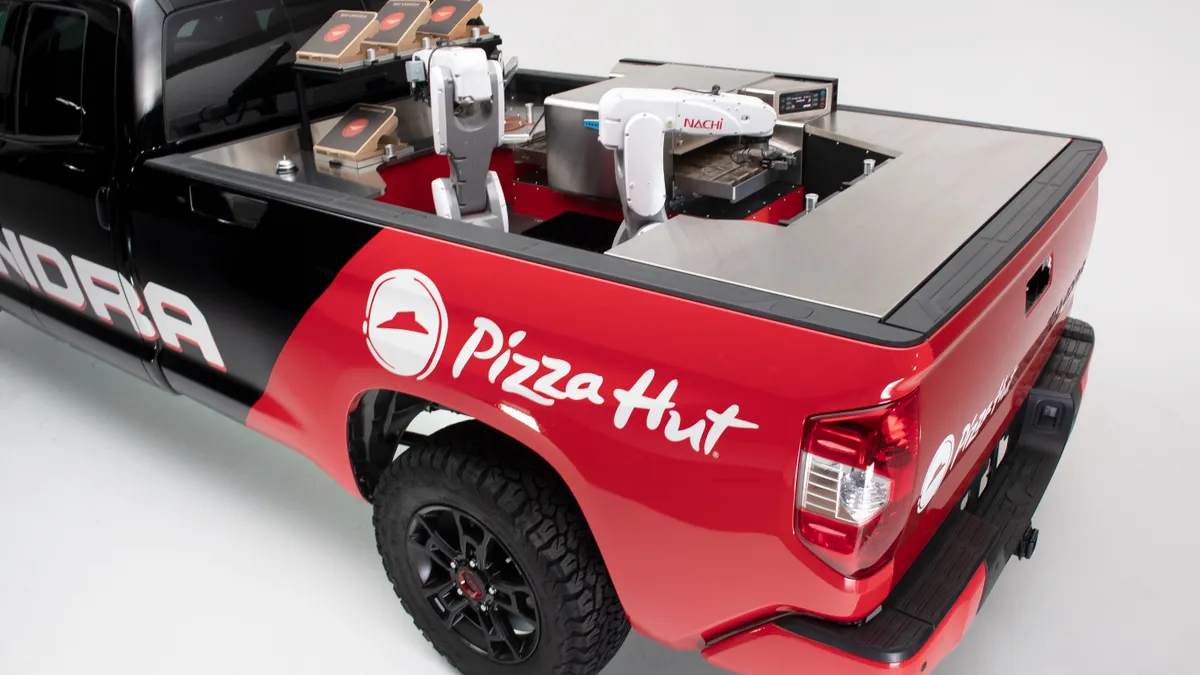Dive Brief:
- As the delivery wars intensify, Pizza Hut has partnered with Toyota to create the Tundra PIE Pro, a souped-up SR5 pick-up truck equipped with a robot pizza-maker in the truck bed, the Yum! Brands restaurant announced in a press release. Both the truck and the robots run on a hydrogen fuel-cell electric power unit, and Toyota showcased the prototype at its annual specialty trade show this week.
- The truck can cook a pizza in seven minutes while en route to customers' homes. One robot arm grabs a pre-made pizza from a refrigerator and transfers it to a high-speed, ventless TurboChef oven. A second robot arm transfers the cooked pizza to a round cutting board, slices it into six pieces and places it into an open box.
- In January, Pizza Hut and Amazon, along with Mazda and Uber, partnered with Toyota’s mobility alliance, a quest to develop autonomous electric delivery vehicles. The PIE Pro prototype, however, is not a driverless car. "We are exploring next-generation solutions and automation to support and streamline our delivery business in the future,” Nicolas Burquier, Pizza Hut's U.S. chief customer and operations officer, said in the release.
Dive Insight:
The battle for pizza market share is hotter than ever, and Pizza Hut's new pie-making truck is just the latest in a delivery technology arms race between U.S. segment leaders. Southern-California based chain Pieology, for example, recently tested a drone pizza delivery in Connecticut, where a drone carried an 11-inch pizza box six blocks in four minutes. The innovation is backed by a $2 million grant, and the top-your-own pizza company plans to launch drone delivery permanently from its Stamford, Connecticut store. Domino's claimed to be the first company to complete a drone pizza delivery two years ago in New Zealand.
But while many pizza players look to the sky for delivery innovation, Pizza Hut has its eyes on the road — a move that could significantly expand the company's delivery footprint and still deliver fresh, hot pizza to its customers.
Still, questions remain about how this mobile pizza factory would perform in real-life traffic, and how soon it will be ready for real world deliveries. In the company's video footage of the technology, the robot arms move slowly and methodically, but how would they deal with sudden brakes and turns, or a pothole? Could it still be deployed in rain or snow?
It’s also unclear whether customers would have a choice in which pizza they could receive from the PIE Pro. The trucks refrigerator holds a number of pre-made pies, featuring only pepperoni pizza in the company's footage of the technology. The robot arm also pulls a fresh box from a shelf above the main workstation, but it seems a human (presumably the truck driver) would have to restock those regularly.
Despite these potential obstacles, this truck has a lot of potential for Pizza Hut — especially as a marketing tool. The current PIE Pro could be a flashy way to bring pizza to the people at festivals, fairs or even a backyard barbecue, and position the chain as an innovation leader in the eyes of its customers.
This distinction would be a welcome boon for the company, which has suffered years of slow sales growth despite boasting more store locations than its competitors. Earlier this year, Pizza Hut lost its sales edge to Domino’s and has generally trailed behind competitors in digital innovation. As the second-biggest chain, Domino’s offers almost a dozen ways to order online, including through Playstation and Amazon’s Alexa, according to Pizza Magazine’s 2018 Power Report. Whereas Domino’s and Papa John’s garner about two-thirds of all sales from digital orders, Pizza Hut sits closer to 55%. Parent company Yum! has not overlooked this discrepancy, doubling the chain’s tech team and investing $130 million last year for upgrades to marketing, operations and digital upgrades.
While Pizza Hut isn't the only pizza brand to invest in delivery vehicle innovations — Domino's has partnered with Ford to experiment with driverless delivery — the company could benefit from a first-mover advantage when it comes to pizza factories on wheels. The chain was also the first to join Toyota's E-Pallate Alliance in January, recently showcased a fully-autonomous vehicle concept. The Tundra PIE Pro is the second collaboration from the two innovation-driven brands.















